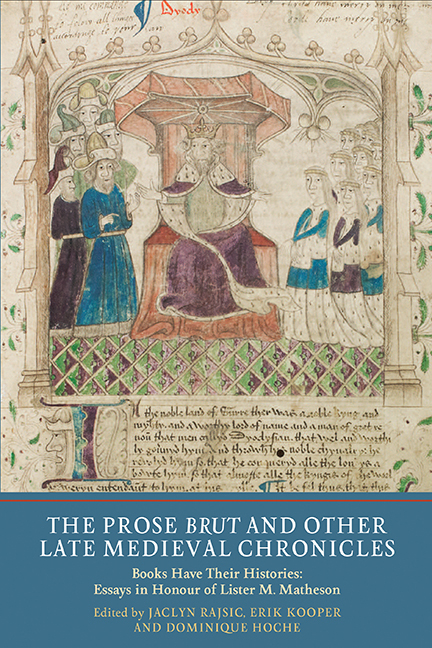 The Prose Brut and Other Late Medieval Chronicles
The Prose Brut and Other Late Medieval Chronicles Book contents
- Frontmatter
- Dedication
- Contents
- List of Plates
- List of Contributors
- Acknowledgements
- Curriculum Vitae of Lister M. Matheson
- Introduction
- A Memoir: The Whole Haggis: Lessons From the Work of Lister M. Matheson
- Part I Uses of History
- 1 Piety, Community and Local History: Le Livere de Reis de Engleterre and its Context in Cambridge, Trinity College, MS R.14.7
- 2 The Seen and the Unseen: Miracles, Marvels and Portents in the Middle English Chronicle of Nicholas Trevet
- 3 ‘And Many Oþer Diuerse Tokens …’: Portents and Wonders in ‘Warkworth's’ Chronicle
- 4 The Lawyer and the Herald
- Part II The Prose Brut
- Part III Receptions and Afterlives of Late Medieval Chronicles
- Index of Manuscripts Cited
- General Index
- Tabula in Memoriam
3 - ‘And Many Oþer Diuerse Tokens …’: Portents and Wonders in ‘Warkworth's’ Chronicle
from Part I - Uses of History
Published online by Cambridge University Press: 05 July 2016
- Frontmatter
- Dedication
- Contents
- List of Plates
- List of Contributors
- Acknowledgements
- Curriculum Vitae of Lister M. Matheson
- Introduction
- A Memoir: The Whole Haggis: Lessons From the Work of Lister M. Matheson
- Part I Uses of History
- 1 Piety, Community and Local History: Le Livere de Reis de Engleterre and its Context in Cambridge, Trinity College, MS R.14.7
- 2 The Seen and the Unseen: Miracles, Marvels and Portents in the Middle English Chronicle of Nicholas Trevet
- 3 ‘And Many Oþer Diuerse Tokens …’: Portents and Wonders in ‘Warkworth's’ Chronicle
- 4 The Lawyer and the Herald
- Part II The Prose Brut
- Part III Receptions and Afterlives of Late Medieval Chronicles
- Index of Manuscripts Cited
- General Index
- Tabula in Memoriam
Summary
PORTENTS are omens, signs of the future. They warn oftentimes of dangers that will come – sometimes momentous in scale – and the devastation that will be wrought. Portents can also exist as marvels, miracles and wonders of an unusual nature that could signify a future event. Portents are found in different types of medieval historical writings: versions of the Middle English Prose Brut, several fifteenth-century chronicles of London, genealogical texts and other medieval histories. For example, Thomas Walsingham, in his Chronica Majora, describes how in 1385 the conjunction of Jupiter and Saturn was followed ‘by the greatest of upheavals in the kingdom’, and that the appearance of a dolphin on Christmas Day in the Thames in London was an omen for trouble between Londoners and Richard II. In this essay I will examine a number of such portents and wonders found in ‘Warkworth's’ Chronicle, which spans the years 1461 to 1474, and discuss how these phenomena can serve as a means by which its author came to terms with the unthinkable yet real: murder, treason, war and other-worldly phenomena. The unnamed author uses the term ‘tokens’ twice to denote events in the chronicle that are of a portentous nature: extreme floods and ‘wo-water’, and the sighting of a headless revenant. Moreover, he describes several events that are not necessarily portents, for they do not attempt to predict a future event. Nevertheless, they invite readers to interpret them as political commentary, especially when read in context with the naturally occurring portents and the author's direct, at times politicized, interpretation of them. Some of these unexplained wonders are associated with Henry VI, while another relates the sighting of the headless being noted above. The author of ‘Warkworth's’ Chronicle reserves comment on the outcome and explicit meaning of the more ambiguous wonders such as these, for his vagueness and oblique strategies of narrative suggest a political climate too caustic and dangerous to report and explain them in a direct and critical manner. Yet, this text is a chronicle, and as is the case with some chroniclers, commentary, brief though it is, is occasionally given on these matters.
- Type
- Chapter
- Information
- The Prose Brut and Other Late Medieval ChroniclesBooks have their Histories. Essays in Honour of Lister M. Matheson, pp. 49 - 63Publisher: Boydell & BrewerPrint publication year: 2016


